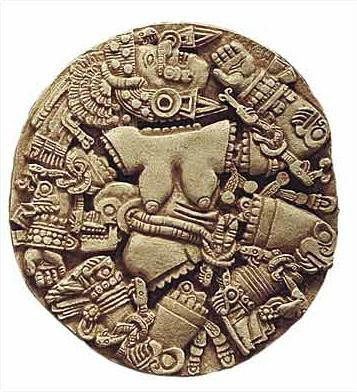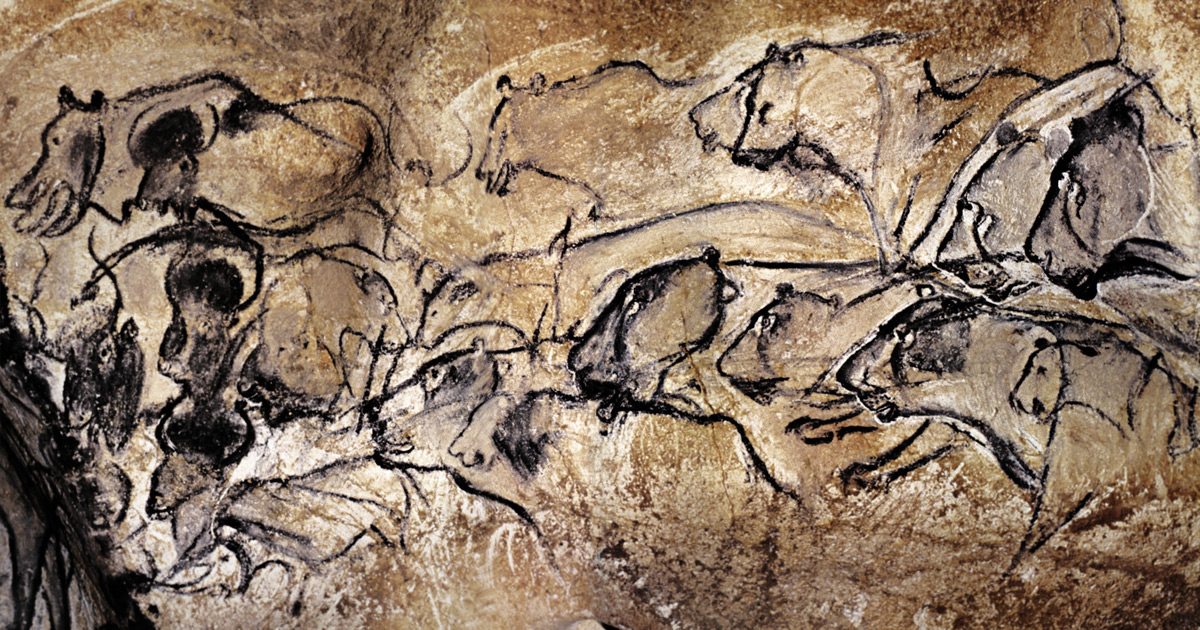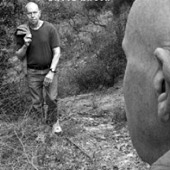Originally published in S/N New World Poetics, a publication edited by Charles Bernstein & Eduardo Espina. Copyright © 2012. All Rights Reserved.
[As Heriberto Yépez & I begin our collaborative composition of a transnational anthology/assemblage of the poetry and poetics of the Americas “from origins to present,” I’m posting the following as an example of his ongoing & truly original exploration of what he here calls a pantopia (“a total space of collected cultural signs”) & its relation in particular to the story of “our Americas” both north & south. “The American dream,” he writes below, “means the dream of a new memory,” which represents as well one of the points of departure for what he & I are currently doing. (J.R.)]
Are we even more conservative than the mainstream?
Common sense was one of the founding forces of American modern literature.
Vox populi has been a strong influence, not only in obvious places—like Whitman’s democratic poetics—but also in authors whom we have learned to identify as difficult or paradoxical—literally meaning, aside from doxa, away from common sense—like Stein, Pound or Olson, whose varieties of patriotic experience are only the tip of the common sense iceberg in all of them.
We cannot discuss the influence of common sense in American conceptual writing without remembering that American common sense is pragmatic at its core.
American pragmatism was a strong element in the formation, for example, of Stein’s word play—her desire, let’s say, of removing connotation or prior meaning, and just staying with the word or phrase in its materiality, staying there, so as to understand that along with the fabulous complexity in her writing there is also in it a crucial will toward the “simple”: a rose as just a rose.
There’s a pervasive positivistic impulse in American experimentalism.
Common sense also played a role in the construction of other early experimental American works like Pound’s, whose prose shows his muscular interest in “getting it across”. I’m referring, of course, to books like ABC of Reading or Guide to Kulchur. His didactic approach—a prolongation of his famous poetic economic principle of not letting anything unnecessary get onto the page—resonates with archetypical American phraseologies like “cut the crap” or “straight talk” (McCain’s 2008 slogan).
Charles Olson’s work not only relates to imperialistic patterns of working through otherness but most importantly his work is guided by what we can say is the basic pragmatic principle—and which also informs most post-modern writing: the transition from indivisible to fragmented time and then from fragmented time into fitting space.
*
We are shifting from a civilization based on the experience of “History”—a notion mostly naturalized since Hegel—toward a new paradigm, a new way of experiencing and ordering reality—still in the making—in which circular, spiral or linear timeness is no longer the semantic master, the central element that gives order to fragments distributed along its field of influence—the control is now exercised by relational space.
In this model space is the giver of being and sense.
This move away from “History” more or less consists in the dissolution of the linear ordering called “time” in favor of playing with those now loose fragments inside a total space of collected cultural signs, a pantopia.
A pantopia is an imaginary space or archive of persistent ruins and new components that not only constitute a compilation of free parts but most importantly makes possible the construction of a neo-memory—in which lightness-of-being permeates every stratum of reality.
By neo-memory I mean the possibility of remaking the archive into another one, with more or less parts than the last one.
The American dream means the dream of a new memory.
That dream has given rise to the turn from History to pantopia, a total space of remixing everything that used to be chained together. Pantopias are History’s junkyards.
Modern poetry in its entirety foreshadowed different avatars of pantopia in the form of techniques, metaphors, images and representations—utopias or dystopias—that allude to a total-market-space in which meaning can be rewired.
Pantopias are all about networking. Negative networking to be exact in which difference is the new ruler of co-control—composed by the simultaneous domain of matriarchy and patriarchy.
In pantopia choice is the prime category. It may well be that the urban capitalistic experience of having choices—what to see, what to buy, what to consume—choice of market, the social element that triggered the imagining of pantopia, the sum and at the same time precondition of every choice one can make.
Baudelaire’s dandy, for example, is one of the first pantopic attempts—the dandy as the subject of a total sight, a sight that appropriates everything through his at the same time indifferent and voracious eyesight.
Bataille called it acephale and Artaud’s, Burroughs’ and Deleuze’s body-without-organs.
Borges calls it aleph while Pound imagines it as a vortex.
Stein and Olson praised it as “American Space”.
Benjamin, by the way, saw it coming. But also Lezama Lima—“Gnostic space” —and Oswald de Andrade—“anthropofagy”. I’m building here, by the way, a pantopic list of pantopia’s prophets.
Pantopia has been also explored by American science-fiction and Hollywood movies—in order to develop a cybermnemics, a control of memories.
In this shift from historical time to total containment-space, gathering, remixing, cross-reference and archiving are the rules of the game.
The pantopic logic is widespread and shapes both the avant-garde and the market. We are now fully entering a pantopic epoch.
*
If the pantopic is replacing what used to be the historical, then what we ordinarily understand as “post-modern” would be a more explicit way in which this change is organizing itself aesthetically.
Citation, de-contextualization, fragmentation, and disjunction in general, could be—whatever this makes us feel in the different experimental scenes—modes of production that unwillingly mirror and predict psychohistorical hegemonic formations at the social levels in the next decades.
This shouldn’t surprise us. In writing almost everything is reactionary in advance.
Literature can be defined as the forerunner of new methods of co-control in the upcoming de-capitalism.
If the concept of History is metaphysically founded, pantopia is mostly a chaosmic fantasy constructed by crypto-pragmatism.
*
Filodoxical pragmatism—friendly to common sense—is in itself a way of synthesizing a corpus of texts, a way of appropriating with great velocity a greater body to form a manageable text-complex-net.
“Cut to the chase” is how History was dismembered. And how cut-spatialized time invented both short story and collage.
Pragmatic speech or writing (whatever its complexity may be) is based on the premise of writing as inclusion of cues, keys, hints, gestures to insiders or stimulus to the reader. Writing conceived as an exercise on cybermnemics.
And a smart-as-clandestine method to continue a de-capitalism that unites in one logic both citation and outsourcing.
In that sense, even the hermetic tendency of contemporary conceptual American writing has a very definitive correlation with pragmatism. I would argue that investigative poetry, appropriation and archive are approaches that have developed in the light of this strange correlation between common sense and experimentalism.
The page as a pantopic opportunity to have many times inside a single space.
American avant-garde and post-modern techniques possess a missing link with American mainstream pragmatism.That pragmatism is at the center of even opposed poetics such as the first thought, best thought don’t worry practice of Ginsberg or Kerouac’s immediate acceptance writing and his quintessential no bullshit no hassle attitude, which is more pragmatic than, in fact, Buddhist.
The same can be said of Cage’s experimental Zen.
And pragmatism is also present in the apparently different ideas or methods of Language and Post-Language writing, where the avoidance of metaphysics shows that Marxism, (mostly hidden) Russian formalism and post-structuralism can be put in the service of, or at least combined with, the typically American pragmatic stance. Now in its pantopic avatars.
Charles Bernstein’s anti-absorption can be understood as a playful variety of pragmatic realism and most definitively an anti-metaphysical and rationalistic poetics based on an intelligent management of archives. A poetics of clearly knowing the artificiality of pantopia, and playing with it.
Unfortunately the brilliance of Bernstein—and that entire generation—can be used as just an entrance to pure clever poetics, i.e, aesthetic dilettantism in which “small things” become inflated “big deal” in the context of career ego fantasy.
English, in its entirety, could be a collection of pragmatic quotes.
Discussing appropriation without challenging its relationship with rising modes of capitalistic ordering would be uncritical.
We in the experimental field may well be one of pragmatism’s secret and cryptic branches.
Allowing History to turn into pantopia, contemporary art and writing have become cryptocapitalisms.
*
Hanna Arendt writes in The Human Condition that the enchantment of “little things” characterizes both modern poetry and the bourgeois spirit. Being caught up in little decisions is one of the defining procedures of most experimentalism, where the presence of a mere comma or the inclusion of a certain word becomes a heroic either/or. The transformation of the little into the Big Deal is not only one defining category of the American experimental poet but also of the American identity in general. It is capitalistic choice—endless possibilities of choosing-among—that which builds the neo-bourgeois bridge between experimentalism and the mainstream.
*
The conceptual turn in art and writing lets us see a crucial moment in the development of the Western intellectual and social mind frame. And so the question is made: is conceptual art a truly progressive mode of representation?
By progressive I mean a departure away from hegemonic tendencies in our civilization.
If we understand its polemical relationship with the Romantic aspects of our high and low cultures, conceptualism does represent a critical alternative to the traditional definition of modern subjects and practices. But we also need to take into account that at the same time that conceptualism departs from Romantic understandings it also closely follows the rationalistic model that also characterizes Modernity.
Conceptual art can be seen as a form of neo-rationalism.
In part conceptual pantopism appeared to prevent the ‘shamanistic’ tendencies of certain avant-gardes that posed the possibility of destroying the clean-cut art form. (By shamanistic I mean how the animal evolves from one orbital of consciousness into another). The minimalist and cool aspects of early conceptual art show us its clear communication with the way pragmatism and rationalism in general defend theory-based works against bodily mess and spiritual verticality.
Conceptual art has a historical relationship with analytical philosophy, that is, anti-vertical tendencies, founded on mathematical thinking—Wittgenstein and how Wittgenstein was used by pragmatism in the Anglo world—Conceptualism has a great deal to do with posing an alternative to the psychoanalytic impulse in which art seemed again to be rooted in something more than reception in the social sphere.
Conceptual art served as a counterweight to tendencies in art which threatened to return us to an understanding of art as coming from a depth-world in the “soul”. Conceptual art kept the definition of the aesthetic experience as mostly social. More philosophic than psychological. More cultural than genetic.
The key here was semiotic sign versus psychic symbol. If the work of art, or text, is understood as set of arbitrary-cultural-historical signs—doesn’t matter if it’s in Saussure’s or in Derrida’s sense—and not as a series of symbols deeply seated in the movement of psychological autonomous entities, then, we can get rid of the risk of getting close to a non-rationalistic explanation of what are the foundations of art.
Semiotics and its offspring—conceptual art—resolves too quickly and in a very traditionally Western way—a rationalistic and pragmatic way—the question about whether there’s a non-social element or “root” in representation.
It could well be that Khlebnikov and not Saussure was right.
The “sign” does have a trans-mental charge or meaning prior to its social sense.
Derrida broke with many things Western, but not with its central axis: rationalism. Derrida himself defined deconstruction as a new form of rationality.
He mainly discussed with Freud—not Jung, whom he didn’t take seriously at all.
Deconstruction was built on the basis of a critique on Levi-Strauss’s positivistic view of myth not on Eliade’s. Derrida is mostly rationalistic.
And so are we.
Conceptual art could be the coolest conservatism we have constructed in order to safeguard our most retrograde rationalistic world view.
And that’s problematic.
*
The post-historical union of fragmented “cultural” states is what I call the United-States, the central manifestation of pantopia.
The denial of depth in current American experimentalism and the denial of mammal evolution in the human species in American mainstream schools are part of the same American logic: this—We—is the only reality that can exist. Nothing can surpass us or be more profound than this.
We. Here. As it is. And nothing more. Just This. The Supreme.
*
We are still living inside the semiotic age of art.
Conceptual art and writing has a strong relationship with the dominant definition of man in our contemporary societies and particularly in the university social classes. And this has everything to do with archiving and handling collections of signs. Society at large implies and employs consumption as its immediate category. We are writing—whether verbally or visually—texts that appeal to our consumption-ridden tendencies. An experimental piece, for example, most of the time is executed and understood as a series of signals or calls made to us to become aware that the piece implies playing with horizontal codes that ask for the possession of a corpus which translates those signs into others.
Conceptual art and writing fundamentally are practices sustained by a certain anthropoetic project—conceptual practices construct a certain human subject which relates to otherness in certain ways. This anthropoiesis—man making—consists in the formation of semiotic man.
Deregulated man merely floating in the free market of purely relational economy.
Semiotic man builds structures in which pleasure is derived from relating entities arbitrarily as if the disappointment of the non-existence of ‘Nature’ or ‘Essence’ asked for a vengeance in defense of absurdity. A turn from metaphysical to telephysical fancy.
Semiotic laissez faire attains excellence when perfected by higher education—where education is understood as the acquisition of a corpus of complex references which help us experience a free translation of one text into another toward the formation of a semiotic United-States of cultural fragments.
And how playing with the right—and left—codes of pantopic culture gives us a sense of both mastering and belonging: co-control.
*
The pleasure of episteme: we find delight in understanding a text beyond others.
And we find delight in consciously controlling the pantopic production of meaning—so as to assure that the I that consumes, the I who is called the reader, still is the main agency in the prison-house of language.
Quotes assure us we’re socially real.
And integrate us into the cybermnemic.
*
Academia is scholarly pantopia.
*
We know that mainstream writing and art have a lot to do with the traditional scheme of Judeo-Christianity and how poetry, narrative or images reiterate beliefs, emotions, “neurosis”, and all forms of denial of experience—what Debord called ‘spectacle’—and we also know that we must continue to destroy all of those reactionary values.
But we are at the point—after more than a half century of experience with conceptualism and other forms of avant-garde or post-modern experimental practices— where we need to see we are not the “good ones”, regardless of how much feminism, deconstruction, post-colonialism and all our theoretical bibles push us to believe we are the saved pack.
New social modes of production are suggested by old ones. The suggestion is frequently picked up, knowingly or not, by literature and art. In that way, art is tricked to feel itself ahead of its time.
In the experimental mode of production of visual and verbal aesthetic materials we are now at the point where along with the constant emphasis of fighting against the paradigms of Judeo-Christianity without granting any opportunity for its return—something which I think American universities have mostly renounced in the name of “political correctness” and “religious tolerance” in the classroom—we also need to radicalize our definition of ourselves as thinkers-writers-artisst-professors.
Pantopia is reached when cultural relativism is canonical.
The be-careful educational American system is stopping intellectual development in its thinkers, writers and artists. The conservative moralist tendencies—both from the left and the right—inside universities are the main force against the emergence of new radical forms.
Not the market.
We are teaching students to become perfect intellectual consumers.
We are handling knowledge as a collection of discourses that can be safely mixed in a “critical” pantopia, where everything, at the end, becomes units of information—that later becomes cultural capital.
*
Having become a giver of pantopic information, the professor plays the role of the knower who, in fact, does not possess any superior ethical knowledge. I am stating this in the context of discussing archive and appropriation because when parrhesia is removed from the teaching profession—when the teacher does not work in oneself in order to acquire parrhesia—then the professor becomes a cultural worker whose function is to guide students on how to practice the consumption of diverse discourses, texts and con-texts, a know-how that will insert him or her in the national and international division of academic or aesthetic labor—where how to appropriate is the key to succeed.
The teacher and subsequently the writer or artist is conceived as somebody who possesses the right references and knows how to play with the endless semiotic possibilities derived from the surface of the text.
An expert on archive.
*
Parrhesia basically means “fearless speech”, a knowledge that is gained when you have embarked on a long process of putting your body, emotions and mind in disensual states of being—in tension with oneself. Once you have acquired parrhesia you are responsible for using it in society, not only knowing that exercising parrhesia can be detrimental to your safety but also knowing that just claiming you have parrhesia is going to put you in a difficult position in a society which may be offended or simply does not believe there are superior ways of experiencing consciousness other than the ones it is accustomed to.
We should credit Foucault with returning the term parrhesia to philosophical and, in general, contemporary theoretical circulation. But let’s not forget that Foucault himself, because he didn’t want to abandon the traditional Western figure of “just” being a professor or “just” being an academic writer, consisted, as an intellectual figure, in not accepting parrhesia!
Until the end of his career and life, he portrayed himself as a traditional Western intellectual subject, as though what he researched in his late work—how the subject is historically constructed—didn’t change him a bit, when the case was, in fact, that the evidence he uncovered could give him the opportunity to change his own definition of himself as “professor” or “academic writer” but he didn’t.
Foucault saw himself, at the end, as a social scientist, who could study all these subjects without putting his own subjectivity into question. That was a failure on Foucault’s part to go beyond the technologies of the self in Western literature and theory.
*
Duchamp knew all of this.
Ready made was one of Duchamp’s word plays. And ready made means ready-maid (an irony there). An irony on how transparency can not happen. How maid-surrender is not possible. How the maid is not ready.
So what apparently hasn’t been understood is that ready made (being ironical!) translates as not-ready, not-made, not-ready-made.
As a not-ready-made it asks for a something-else.
That something-else can be a concept in a rationalistic age. But it could also be asking for a something-else which is a psychic depth.
Ready made is not only a sign but also a symbol.
In either case it is a diabolo.
A diabolo or diablo (a devil) is something that breaks unity, disarticulates.
(Ready made is pure philately.).
Ready made means how no interpretation can arise from the experience of the piece as it is. It needs something-else.
So ready made also means not ready to be Read.
Not ready. Not maid. Not Rhea. Not readable-made.
(In that sense, Duchamp hasn’t been understood at all. In the United States, Duchamp has been read as if he was Warhol.)
Ready made indicates the isolation gained by every fragment of culture when it became separated from its previous order (“history”) and entered into the pantopic archive where the capitalistic ‘everything goes’ translates into all sorts of ‘cultural’ practices. Ready made is self-ironical. Not literal—as it has mostly been taken: as if Duchamp was Danto.
Duchamp’s ready made is a self made irony. Those object-gestures are ambivalent—ironical—toward the dichotomy depth/surface in meaning production. It is no accident that a fountain and a shovel—to just mention two of the most philatelic of the ready-mades—allude to depth and at the same its disconnect.
The ready made is not only an immediate satori but also a Kafkaesque delay of sense.
“Ready”, I repeat, alludes to read. As if Duchamp, knowingly or not, suspected that from then on we would fall into an epoch of aesthetic production where works were basically going to be made to be read.
And he was making fun of this ready-read age.
Ready made, then, implies an irony against works which are made to be read in a (pragmatic) ready way.
Works made to be ready to be read.
Which I think is a concise definition of conceptualism, i.e., practices which consider and engage with the preeminence of the (social-conscious) reader.
An anthropoiesis of man as subject of free legein—understanding legein as the virtue of freely choosing parts from a pantopic archive with no hierarchy inside.
But that brings all sorts of Western notions into play and at the same time ignores important knowledge and challenging evidence that put those same notions into question.
And that’s problematic.
*
Is language empty or is it already charged or full of meaning before the readers get to it?
It depends, first, on who the reader is. If the reader is the conscious reader, the visible one, you or I, then we can say yes, it is half empty or half full with social meaning, half empty and half full of historical components. But that response is now totally obvious, that is, immediate to our dogmatic scheme of how current Western theories understand texts.
So it’s undeniable, first, that there is a social reading happening in every case reading takes place, so reading is always—as conceptualism understands—unstable, relative and arbitrary—historically determined.
But if the reader of the text is not the conscious reader—or at least not the only one, not the only reader reading the text—the given response falls out of place.
I won’t say, by the way, that the other reader I’m referring to reads the text at the same time as the conscious reader. It may well be the case that (s)he reads the text at a different time and not the same than the conscious reader does. Nor will I say the conscious reader reads it first. It may well be s(he) reads it before or much later than the visible she or he.
We just don’t know in how many simultaneous times a reading takes place.
Pantopia, by the way, builds the illusion that only one space and that only one space controls all findings and remains. My Space!
So there are at least two readers. Or, more precisely, three: because (s)he can be two.
And none of them is unitary. Everyone is more a puzzle than a clear body.
But the two—or three—of them are not necessarily one big—unitary—mess. It appears there’s at least one border between the conscious reader and the other.
When we read, there’s a social reader active but also another reader which I’m not going to call unconscious because that would be to define it from the point of view of the ego—the point of view we need to abandon soon, as we have known for a long time now, but maybe that’s something we can never accomplish.
The unconscious reader is not the so-called “unconscious” but consciousness, which is mostly unconscious of the existence of the so-called “unconscious”.
So what we have called the “unconscious” is, in fact, our consciousness—unconscious about the existence of what it calls the “unconscious”.
So I would simple call it here—both of them—the other reader.
And that other reader—I’m sorry to tell all of us—educated in semiotics, deconstruction and other forms of advanced theoretical neo-rationalistic modes of thinking—does not necessarily read according to social or “historical” patterns.
I like to tell my students—when I play the professor role—that in art and literature—in the life of language or bio-graphy—we are at a problematic stage, similar to that of physics, which has to deal with two sets of different and incompatible laws: those of classic (Newtonian) physics and those of quantum physics.
In our case, in language practices we are split by semiotics—to cover a plural set of social theories that explain the production and reading of social signs—and those discoveries made by psychoanalysis and deep psychology in general.
This means this is one of those epochs when “Negative capability” (Keats) is needed or we are going to suffer a “Crack up” (Fitzgerald).
This is the problematic field in which I ask myself what is writing and what is art. And what is the task of those of us who ask.
We can train the conscious reader to be open and to not cling to fixed meanings of texts or train them to realize that signs have different meanings in cultural space and historical time.
And this training is what we call higher education. Which is fine.
But this is not—like it or not—necessarily the way the other reader, the othereader (“the unconscious”) operates.
To (s)he—it appears—signs are symbols of an un-historical kind.
So (s)he is more akin to a finality, as if (s)he didn’t care about critical theory.
Or post-modernism.
The othereader appears to have a somewhat finite and determined set of meanings that are attached to the language it experiences, regardless of the conscious reader’s social context.
Is the othereader reactionary too?
It may be so.
If the conscious reader operates in pantopia, the other reader operates in timeness.
For now we don’t know enough about (s)he.
*
To describe the state of language of both being (social) (conventional) sign and (unhistorical) (“natural”) symbol I used the term philatelia.
As I have explained elsewhere philatelia means both friend of meaning, friend of finality (telos) and friend of non-sense, friend of the incomplete (atelos).
Philatelia—thanks to an error by Georges Herpin—who invented the term (in a wrong way!) in the middle of the 19th Century—instead of writing philotelia—teleia meaning their tax (taken care of by the sender, i.e, “already-paid” postage)—wrote philately, because he had figured out—erratically—that atelia could mean “tax-free”, “tax-exempt”.
At the end, philately carries two polar meanings in one word. As maybe every word should.
And gives us—by erratics—the opportunity to employ this word with these two opposite sets of meanings.
Philately describes how language is both (social) sign and (non-social) symbol. A postal stamp, for example, is an arbitrary sign for the conscious mind but a mythic symbol for deep timeness.
Every social concept triggers a parallel and maybe contradictory inner process.
We need to move from a conceptual-social-semiotic understanding of our practices to a philatelic acceptance of reality.
The paradigms of post-modern or experimental writing coming out of the 20th Century theory-based practices—their rationalistic and pragmatic blindness to deep psychology—are simply not enough.
But neither do I think of writing in the inherited notions of the NeoRomantic school. It would be plain silly to ignore Marxism and what came after.
Let’s define ourselves as philatelists. Writing and art are philatelia: both love of sense and non-sense, both a social and a non-social phenomenon.
The philatelic condition of writing and the body-mind escape all of our current categories to describe the two of them.
Philatelia I predict will be the key exploration of our time.
[Originally published in S/N New World Poetics, a publication edited by Charles Bernstein & Eduardo Espina. Copyright © 2012. All Rights Reserved.]





















